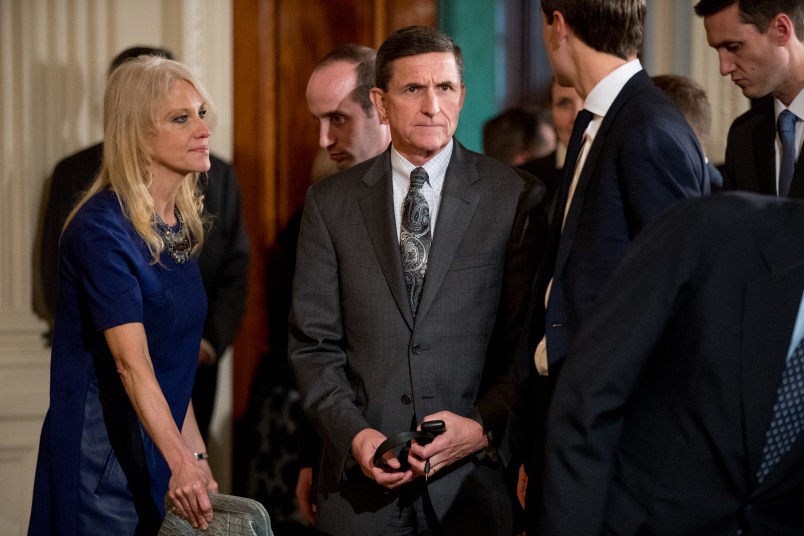Since former National Security Adviser Michael Flynn resigned from his position late Monday, members of President Donald Trump’s administration have given multiple explanations — some directly contradicting each other — for his ouster.
Trump and his top staffers left a number of key questions unanswered, including whether the President trusted Flynn, who was behind Flynn’s resignation, why it happened when it did or who was ultimately at fault.
On Wednesday, Trump launched a broadside against one of his favorite targets: the media.
He called Flynn “a wonderful man” during a joint press conference with Israeli Prime Minister Benjamin Netanyahu and blamed the press for treating Flynn “so badly.”
“I think he’s been treated very, very unfairly by the media, as I call it the fake media, in many cases, and I think it is really a sad thing he was treated so badly,” the President said. “I think that it is very, very unfair what’s happened to General Flynn.”
Trump’s comments stood in stark contrast to his spokesman’s explanation for Flynn’s departure. On Tuesday afternoon, White House press secretary Sean Spicer said that Trump asked Flynn to resign “based on a trust issue” rather than any media treatment.
“The President was very concerned that General Flynn had misled the vice president and others,” Spicer said. “The evolving and eroding level of trust as a result of this situation and a series of other questionable instances is what led the President to ask for General Flynn’s resignation.”
The White House did not immediately respond to TPM’s emails requesting a clarification of the President’s comments.
When reached by phone, White House senior assistant press secretary Michael C. Short said: “Talking Points Memo has reporters?”
Even hours before Flynn resigned, Trump’s administration sent signals that Flynn could remain in his role. Top White House adviser Kellyanne Conway suggested on Monday that the President would stand by his national security adviser.
“Gen. Flynn does enjoy the full confidence of the President,” she said.
Wow— here’s the video of Conway saying Flynn has ‘full confidence’ of Trump. pic.twitter.com/gU4NsXgmKR
— Kyle Griffin (@kylegriffin1) February 13, 2017
Late Monday night, however, Flynn tendered his resignation in a letter to Trump and Vice President Mike Pence.
“I inadvertently briefed the Vice President Elect and others with incomplete information,” he wrote. “I have sincerely apologized to the President and the Vice President, and they have accepted my apology.”
Flynn’s resignation came days after reports revealed that he spoke about sanctions in a call with Russia’s ambassador to the United States before Trump’s inauguration.
This contradicted members of Trump’s administration, including Pence, who previously denied that Flynn and Russian Ambassador Sergey Kislyak discussed sanctions.
Conway insisted on Tuesday morning that it was Flynn’s decision to resign.
“He knew he became a lightning rod, and he made that decision,” she said. “in the end, it was misleading the Vice President that made the situation unsustainable.”
By mid-morning, however, House Speaker Paul Ryan (R-WI) had a different story. Ryan said that Flynn was ousted for misrepresenting his conversations with Kislyak, but told reporters that Trump asked Flynn to resign.
NEW: Speaker Ryan: President Trump “made the right decision to ask for” Gen. Flynn’s resignation. https://t.co/x2ib0UeeuH pic.twitter.com/IzKGmjYfLO
— ABC News (@ABC) February 14, 2017
“I think the President made the right decision to ask for his resignation,” Ryan said at a press briefing with Republican leadership. “You cannot have a national security adviser misleading the Vice President and others.”
A White House official confirmed to TPM on Tuesday that Flynn was asked to step down.











Esme - You are going to be a star.
“These people couldn’t run a two-car funeral.”
— Washington Gov. Jay Inslee
Gary Larson has a cartoon for any contingency.
Well done, Esme!
FBI agents interviewed Flynn.
Lying to the FBI is a felony.
Has anyone seen the transcript?
It’s far more likely that “what’s happened to General Flynn” is very, very felonious.
And just whom else in the Trump administration has the FBI interviewed?